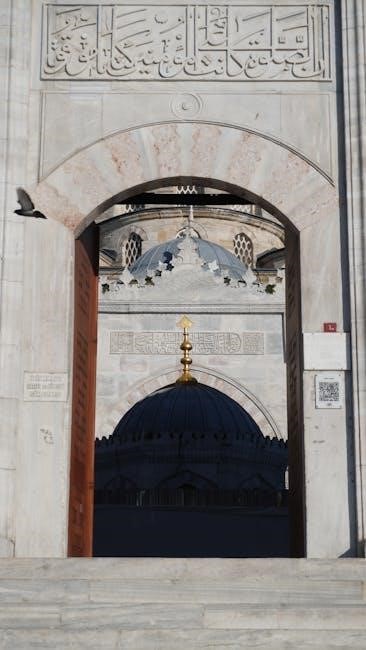The core teachings include the Five Pillars: faith, prayer, charity, fasting, and pilgrimage. Islam’s truth is often explored through its moral guidance, historical authenticity, and personal spiritual experiences.
1.1. Definition and Core Beliefs
1.2. The Significance of the Quran and Hadith
The Quran is regarded as the literal word of God (Allah) as revealed to Prophet Muhammad, serving as the ultimate source of Islamic teachings. It provides guidance on faith, worship, morality, and law, making it central to Muslim life. The Hadith, comprising the Prophet’s sayings, actions, and approvals, complements the Quran, offering practical examples of its teachings. Together, they form the foundation of Islamic jurisprudence and ethics; The Quran’s linguistic miracle (I’jaz) and historical preservation are seen as evidence of its divine origin. The Hadith, carefully authenticated through chains of narration, ensures the accuracy of the Prophet’s traditions. Both texts are revered for their timeless wisdom, addressing human needs across generations and providing a moral framework for personal and societal conduct.
1.3. The Role of Faith and Practice
Faith and practice are inseparable in Islam, forming the backbone of a Muslim’s spiritual and daily life. Faith (iman) refers to the belief in the oneness of God, the prophethood of Muhammad, and the acceptance of divine decree. Practice (amal) encompasses the physical and moral actions that reflect this belief, such as the Five Pillars of Islam: the declaration of faith, prayer, charity, fasting, and pilgrimage.
The interplay between faith and practice ensures a balanced approach to worship and ethical living. Faith without practice is considered incomplete, while practice without faith lacks spiritual depth. Together, they guide Muslims to cultivate compassion, justice, and self-discipline, fostering a holistic way of life that aligns with divine teachings.
This synergy emphasizes Islam’s emphasis on both inner conviction and outward actions, creating a path to spiritual growth and societal harmony. The integration of faith and practice is a testament to Islam’s comprehensive guidance for personal and communal well-being.

Historical Authenticity of Islam
2.1. The Life and Teachings of Prophet Muhammad
2.2. The Preservation of the Quran
The Quran’s preservation is a cornerstone of its authenticity, as it has remained unchanged since its revelation to Prophet Muhammad over 1,400 years ago.
The process of memorization, known as hifz, ensures the Quran is preserved in the hearts of millions of Muslims worldwide, maintaining its textual integrity.
Additionally, the written form was meticulously compiled during the caliphates of Abu Bakr and Uthman, with strict measures to ensure accuracy and uniformity across all copies.
Modern manuscript discoveries, such as the Topkapi and Birmingham manuscripts, confirm the Quran’s consistency over centuries, with no significant discrepancies found.
This unparalleled preservation underscores the Quran’s divine nature and serves as evidence of Islam’s truth, as attested by scholars and believers alike.
2.3. Archaeological Evidence Supporting Islamic History
Archaeological discoveries have provided significant evidence supporting Islamic history, particularly the early Islamic period. Excavations in Mecca and Medina have uncovered artifacts that align with descriptions in Islamic texts, such as ancient pottery, coins, and inscriptions.
The Dome of the Rock in Jerusalem, built in 691 CE, is one of the earliest surviving Islamic monuments. Its inscriptions confirm key Islamic beliefs, including the oneness of God and the prophethood of Muhammad.
Archaeological findings also highlight the expansion of Islam through trade routes, with evidence of Islamic influence in regions like Spain, India, and Southeast Asia. These discoveries validate historical accounts of Islamic civilization’s spread and development.
Such evidence strengthens the historical authenticity of Islamic narratives, offering tangible proof of the religion’s roots and evolution over centuries.
Scientific Miracles in the Quran
The Quran describes scientific phenomena like embryonic development and cosmic expansion with remarkable accuracy, offering insights that align with modern discoveries in medicine, astronomy, and biology.
3.1. Embryonic Development
The Quran provides detailed descriptions of embryonic development, which align with modern scientific discoveries. For instance, the Quran mentions the formation of the embryo in stages, such as the zygote, blastocyst, and fetus, in verses like 39:6 and 22:5. These descriptions were unknown in the 7th century, making them a subject of marvel and reflection. The Quran also highlights the nurturing of the embryo in the womb, referencing the placenta and amniotic fluid, which are essential for fetal development. Such precise details, centuries ahead of their time, are often cited as evidence of the Quran’s divine origin. These scientific miracles not only demonstrate the Quran’s accuracy but also serve as a testament to its timeless wisdom, offering insights into human creation that were only verified by modern science. This alignment between sacred text and scientific fact continues to inspire awe and curiosity among scholars and believers alike.
3.2. Cosmological Discoveries
The Quran contains descriptions of cosmic phenomena that align with modern scientific discoveries, such as the expansion of the universe and the formation of galaxies. For instance, the Quran mentions the creation of the heavens and earth in stages, which parallels the Big Bang theory. Verses like “Do the disbelievers not realize that the heavens and earth were once one mass, and We split them apart?” (Quran 21:30) suggest a cosmic separation, echoing scientific explanations of the universe’s origin. Additionally, the Quran describes the universe as a balanced and orderly system, maintained by precise physical laws, which modern cosmology confirms. These parallels are seen by many as evidence of divine revelation, supporting the belief that Islam is true and divinely inspired.
3.3. Medical and Health-Related Miracles
The Quran contains numerous verses that align with modern medical discoveries, offering insights into health and wellness. It emphasizes the importance of cleanliness, moderation, and natural remedies.
- The Quranic instruction to wash hands before eating and to avoid harmful substances mirrors contemporary hygiene practices.
- Prophetic traditions highlight the benefits of natural remedies, such as honey and olive oil, which are now scientifically validated.
- The Islamic practice of fasting during Ramadan has been shown to promote detoxification and improve mental clarity.
- Guidance on proper eating habits, such as eating slowly and avoiding overeating, aligns with modern dietary advice.

These health-related teachings, revealed centuries ago, demonstrate a deep understanding of human well-being, further supporting the divine wisdom of Islam.

Moral and Ethical Teachings of Islam
4.1. The Concept of Justice and Fairness
4.2. The Importance of Compassion and Charity
4.3. Guidelines for Personal and Social Conduct

Personal Testimonies and Experiences
Many individuals share stories of overcoming doubts and strengthening their faith in Islam. Personal journeys highlight spiritual growth and fulfillment through Islamic practices and teachings.
5.1. Stories of Converts to Islam
Many individuals who embrace Islam share compelling stories of personal transformation and spiritual awakening. Converts often highlight the clarity and logic of Islamic teachings, which resonate deeply with their search for truth. Some are drawn to the Quran’s linguistic beauty and moral guidance, while others find solace in the structured lifestyle Islam offers. Personal testimonies reveal journeys marked by overcoming doubts, emotional struggles, and intellectual curiosity. These narratives often emphasize the role of compassion, justice, and the sense of community within Islam. Converts frequently speak of feeling a profound connection to Allah and a renewed purpose in life. Their stories illustrate the universal appeal of Islam, transcending cultural and linguistic barriers. These experiences serve as powerful reminders of faith’s transformative power and the diverse ways people find meaning in Islamic teachings.
5.2. Overcoming Doubts and Strengthening Faith
Many individuals face doubts about Islam, often exacerbated by overthinking and anxiety. Personal biases and external influences can cloud one’s understanding, leading to spiritual uncertainty. However, Islam encourages seeking knowledge and reflection to address these doubts; Engaging with the Quran, Hadith, and scholarly discussions can provide clarity and strengthen faith. For instance, exploring the scientific miracles in the Quran or historical authenticity often rekindles conviction. Personal testimonies reveal that many return to Islam after overcoming doubts, finding it either inherently true or deeply resonant with their values. Community support, such as discussions with scholars or fellow believers, also plays a crucial role in reaffirming faith. Ultimately, Islam teaches that doubt is natural but can be overcome through sincere effort, prayer, and a commitment to understanding its teachings.
5.3. The Impact of Islamic Practices on Daily Life

Addressing Common Questions and Misconceptions
6.1; Islam’s Stance on Terrorism
6.2. The Role of Women in Islam
In Islam, women hold a significant and respected position, with rights and responsibilities outlined in the Quran and Hadith. They are considered equals in spirituality and are entitled to education, inheritance, and personal autonomy.
Islamic teachings emphasize modesty, dignity, and mutual respect between genders. Women are encouraged to contribute to society through various roles, including education, charity, and family nurturing. While misconceptions persist, Islam advocates for justice and fairness, ensuring women’s voices are valued and their rights protected.
6.3. Islamic Views on Other Religions
7.1. Summarizing the Evidence

The evidence supporting Islam’s truth encompasses historical authenticity, scientific insights, and moral teachings. The Quran’s preservation and prophetic traditions provide a reliable foundation. Scientific discoveries, such as embryonic development and cosmological phenomena, align with Quranic descriptions, suggesting divine inspiration. Moral and ethical guidelines promote justice, compassion, and personal integrity, resonating universally. Personal testimonies of converts and believers highlight transformative faith experiences, overcoming doubts, and the practical impact of Islamic practices. These elements collectively present a compelling case for Islam’s validity, addressing both intellectual and spiritual inquiries.
7.2. The Universal Appeal of Islam
